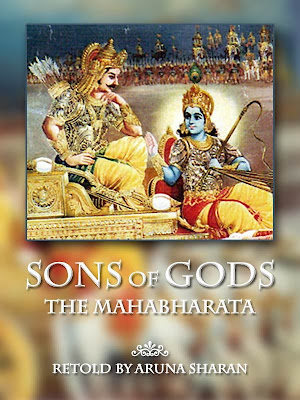Myths of Mankind: The Mahabharata. Part One
Here's a great documentary series on the Mahabharata, exploring it in the context of India's history, archeology, sociology etc.Young officers or civil servants arriving for the first time in their new home among the palm fronds and rice fields, or in the heat and dust of a desert cantonment, would commonly be told by some well-meaning old India hand that if they wished to grasp the essence of the place and its people they should read one book: the Mahabharata, the world’s oldest epic by far, and with 90000 verses exceeding the Bible and all of Shakespeare’s plays bundled together by far the world’s longest and greatest epic poem."
From "Myths of India,: The Mahabharata. Part 1".
But why should modern readers, living in the West and eons away from India both in terms of mileage and mentality, want to read a book written centuries ago? What could such a book possibly have to say to them? Why should they pick it up, if there was no previous particular interest in India or its culture?
To this I say: because the story is timeless, and speaks to a dimension of the human spirit that is equally timeless, and behind the action lie themes that are as much a part of the human situation today as they were those 50 centuries ago in a far-off land. Values, that we cherish as much today as did the mythical heroes of this grand story: loyalty, friendship, truth, love, bravery. The "character flaws that drive the action in this story are as much alive today as they were: greed, envy, jealousy, lust, covetousness, betrayal, addiction...
It is a story larger than life, and as relevant to modern day America or Europe as to ancient -- or for that matter modern -- India.
If you have the time, watch the video below. The whole documentary series can be watched on this site:
Myths of India: The Mahabharata
From "Myths of India,: The Mahabharata. Part 1".
But why should modern readers, living in the West and eons away from India both in terms of mileage and mentality, want to read a book written centuries ago? What could such a book possibly have to say to them? Why should they pick it up, if there was no previous particular interest in India or its culture?
To this I say: because the story is timeless, and speaks to a dimension of the human spirit that is equally timeless, and behind the action lie themes that are as much a part of the human situation today as they were those 50 centuries ago in a far-off land. Values, that we cherish as much today as did the mythical heroes of this grand story: loyalty, friendship, truth, love, bravery. The "character flaws that drive the action in this story are as much alive today as they were: greed, envy, jealousy, lust, covetousness, betrayal, addiction...
It is a story larger than life, and as relevant to modern day America or Europe as to ancient -- or for that matter modern -- India.
If you have the time, watch the video below. The whole documentary series can be watched on this site:
Myths of India: The Mahabharata



Comments